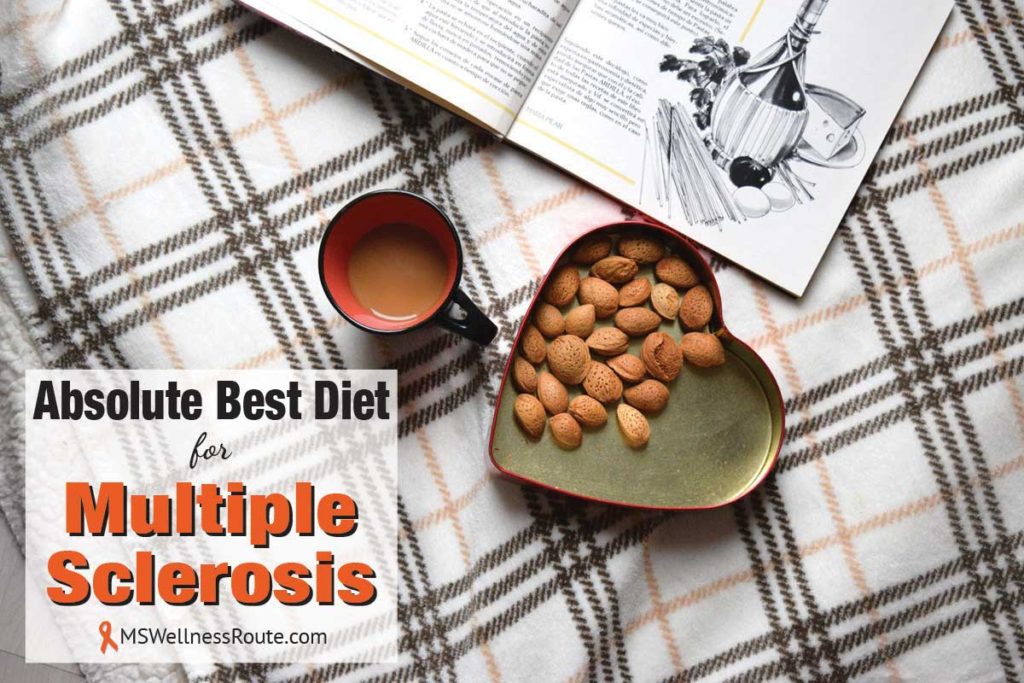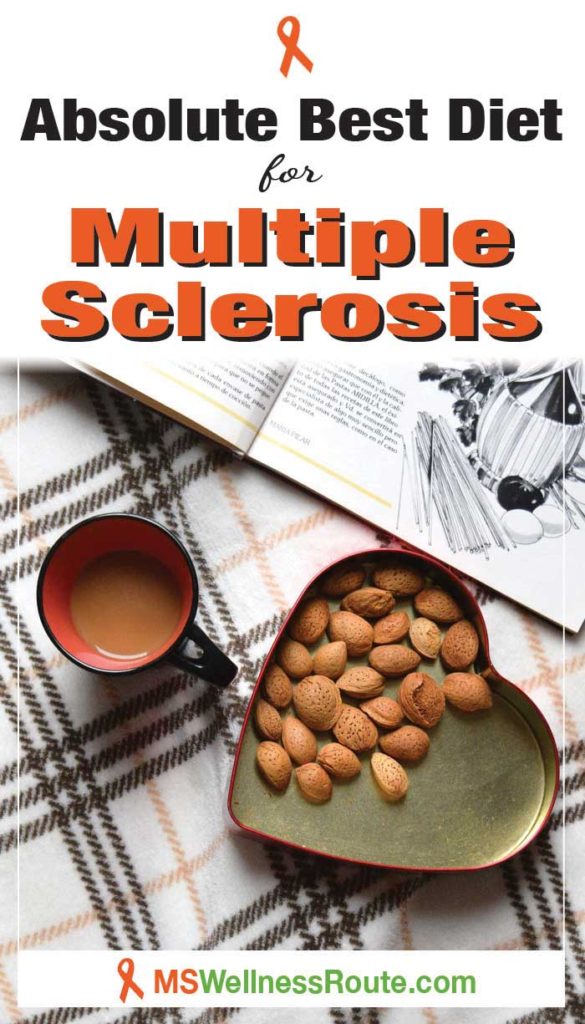Last Updated on January 31, 2025 by Cathy

If you’ve done an internet search for “what’s the absolute best diet for multiple sclerosis (MS)” a lot of websites and blogs pop up. The problem is, they are all different making it hard to choose which is right for you. I went through this myself.
After many different diets, I realized there are no perfect diets for MS. Don’t get me wrong, since this blog is about using food as medicine. But just because one diet may have worked for many people doesn’t mean it will work for you.
Each time I started a new diet I would get my hopes up that this would be the one. But, after a few years and not seeing my symptoms reversing as people claimed, I’d get discouraged.
There have been few studies looking at a specific diet as a way of managing MS. Some have shown diet may be a complementary treatment to control the progression. But, not one MS diet stands out as the best option for every MS patient. It took me several years before I realized it really depends on me and how my body reacts to food. The diet protocol I currently use is one I created that works for me.
The Genetics of MS
“the cause of MS is multifactorial and include genetic predisposition together with environmental factors.” – PubMed
Researchers discovered many genes contributing a small amount to developing MS. However, the HLA-DRB1 gene has about three times the genetic risk factor. You can see my results from my DNA test in the image below.

You can’t change your genes but you can change your gene expression by living a healthy lifestyle. Plus, your genes only play a small role. Environmental factors are the main cause of the onset of MS.
“Genes Load The Gun but Lifestyle Pulls the Trigger” – Mehmet Oz
Researchers discovered this when they studied identical twins. It turns out that when one twin has MS the odds that the other twin will develop MS is only a 30% chance. This means there’s a 70% chance the other twin won’t have MS.
This led researchers to believe environmental factors played an important role. Twins may enter the world with the same risk for MS. However, their individual habits and exposures determine whether they develop MS or not.
This is good news. – Why?
Because YOU can control your environment and your behavior. – Starting with your diet.
The Best Diet for MS
The best diet for MS is what’s best for you. Start with an anti-inflammatory diet then adjust it to fit your needs. Just because the food item is healthy doesn’t mean it’s healthy for you. For example, avocados and coconut oil are healthy fats. They’re promoted on many blogs and are in many healthy recipes. But for me, I’m sensitive to both avocados and coconut.
To help find food sensitivities try a food elimination diet. This is where you remove common food triggers for a short amount of time and then introduce them back. It’s important to try one food at a time otherwise you won’t know which caused the problem.
To learn more click here >>> Why You Should Try An Elimination Diet
Trigger Foods

Sometimes a food-elimination diet isn’t enough and you may need to get a food sensitivity test. A food sensitivity is different from a life-threatening food allergy. Food sensitivity is an immune response by the IgG antibody. Don’t get it confused with a food allergy test.
It’s best to contact your doctor or functional medicine provider.
Plus, it’s not only a particular food item, it could be a group of foods that cause problems for you.
Nightshades
Nightshades are a botanical family of foods and spices that contain alkaloids. Alkaloids protect the plant from hungry insects, its nature’s pesticide.
Common edible nightshades include:
- Bell peppers
- Eggplant
- Peppers, hot and sweet
- Potatoes (not sweet potatoes)
- Spices (cayenne, chili powder, paprika, etc.)
- Tomatoes
FODMAP
A low FODMAP diet can help people with digestive stress. Usually, people with IBS or SIBO will benefit from eating a low FODMAP diet.
High FODMAP foods:
- Apples
- Artichokes
- Asparagus
- Beans and lentils
- Cherries
- Dairy
- Garlic
- Onions
- Peaches
- Pears
- Wheat
Histamines

Histamine intolerance isn’t just for people with allergies. For some people, their body isn’t able to break down histamines effectively. A low-histamine diet can be helpful.
Foods high in histamines:
- Alcohol
- Avocado
- Barbecued or charred meats
- Canned foods
- Dried fruit
- Fermented foods
- Leftovers
- Tea
- Tomatoes
- Vinegar
Mycotoxins
Foods high in mold are another group of foods that could be causing problems. If you live or work in a moldy building you may have a high level of mycotoxins. It is not only a moldy environment, certain foods are higher in mold than others.
First, you need to remove yourself from the mold source. Second, you need to eat a low-mold diet.
Foods high in mold:
- Alcohol
- Cheese
- Dried fruit
- Fermented foods
- Grains
- Mushrooms and truffles
- Nuts
- Packaged and smoked meats (bacon, ham, sausages, etc.)
Low Carbohydrates
A low carbohydrate diet can benefit most people whether they have MS or not. But, many studies linked MS with Candida albicans. Candida is a yeast overgrowth that can spread throughout the body releasing toxins.
To get Candida under control it is important to take antifungals and eat a diet low in yeast and carbs/sugar. – Sugar feeds Candida.
Foods to avoid:
- Alcohol
- Caffeinated drinks (except green tea)
- Condiments
- Dairy
- Dried fruit
- Fruits high in sugar (banana, dates, grapes, mango, etc.)
- Grains
- Moldy nuts
- Processed meats
- Refined/processed fats and oils
- Sugar, including natural sugars
- Toxic fish (shellfish, swordfish, tuna, etc.)
Quick Links To Information In This Post:
DNA Test For Multiple Sclerosis
Are Nightshades Bad?
How Histamines Affect You
The Link Between Candida And MS
Absolute Best Diet for MS
The absolute best diet for MS is one that is designed for you. While each of these diets above focuses on reducing inflammation they don’t focus on omitting infections that cause disease. Infections such as Candida, Lyme disease, mycotoxins, parasites, and SIBO.
For me, I eat a paleo-based diet but altered it to fit my needs. I eat a low-histamine, low-mercury, low-mold, low-yeast diet. As far as my body goes there were many issues I was dealing with including:
- Food sensitivities
- Histamines
- Hormones (cortisol, vitamin D)
- Mercury
- Mycotoxins
- Stress
- Yeast overgrowth
It seems like a lot of effort but it is but it’s worth your health!

Free Wellness Library!
Subscribe for free and I’ll send you the password to my secret library filled with many printables for your wellness journey.
Want to remember this health tip? Pin it to your favorite Pinterest board!

Resources:
https://pubmed.ncbi.nlm.nih.gov/28507011/
Photos courtesy of meineresterampe and Mimzy from Pixabay and Mikhail Nilov from Pexels.
Absolute Best Diet for MS





